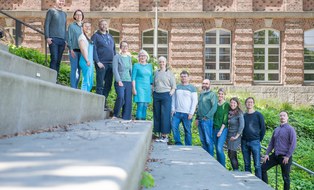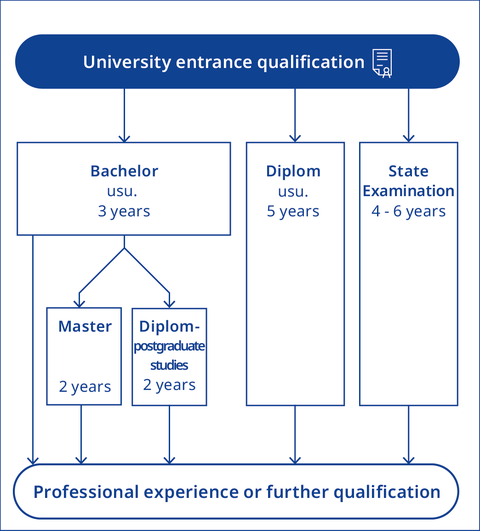Academic Degrees
Table of contents
At TUD Dresden University of Technology, the following degree certificates can be achieved:
- Bachelor's degree
- Master's degree
- Diplom and
- State Examination
A university entrance qualification (e.g. Abitur) must first be achieved before participating in Bachelor's, Diplom and State Examination degree programs. Master's and postgraduate courses require the completion of an undergraduate degree. This is usually a Bachelor's degree.
The Master's degree, Diplom and State Examination are all the same degree level upon completion. Subsequently, the student can choose to begin their doctoral studies (to acquire a doctorate).
All degrees are recognized within the European Higher Education Area. This means that the degree certificates are comparable throughout Europe and the graded academic work can be credited at any German or European university (applies to a limited extent to the State Examination). This makes it possible to change your study location, degree program, or even to study abroad.
Information on which degree program at TUD Dresden University of Technology corresponds to which qualification can be found in the study information system.
Bachelor’s degree
In the Bachelor's degree course, students gain knowledge of fundamental scientific principles, application-oriented skills and professional qualifications. Social and other key skills round off the course.
In some Bachelor's degree programs (especially in the humanities), students cover a number of subjects at the same time, each weighted as either a major subjects or supplementary areas. A Bachelor's thesis is written at the end of the program.
TUD Dresden University of Technology awards the academic degree "Bachelor of Science" in the natural and engineering sciences and the academic degree "Bachelor of Arts" in the humanities and social sciences.
The Bachelor's degree is an undergraduate university degree that qualifies the recipient for entry into the professional world. They can subsequently begin their career or continue to study for a Master's degree. Alternatively, you could continue your academic journey with an advanced Diplom course.
Master’s degree
The Master's degree program enables in-depth study or specialization in the same or a similar subject area to which the student achieved their initial university-level qualification, or even an interdisciplinary expansion of existing qualifications.
The Master's degree program prepares students both for an academic career at a university as well as for professional fields that require in-depth academic training. There are also continuing education degree programs that lead to a Master's degree. These however require previous experience in a professional context.
The degree program concludes with the Master's thesis, an independent academic paper. At TUD Dresden University of Technology, the main academic degrees awarded are "Master of Science" and "Master of Arts."
The Master's degree program offers the opportunity to choose both the study location and the subject focus of the degree program.
Diplom
The Diplom, which is mainly offered for engineering sciences, is generally divided into a (usually two-year) foundation course and a subsequent advanced course. The main course of study serves to deepen the student’s previously acquired skills and to allow them to specialize academically. To this end, students should choose a field of study or specialization in line with their own interests and future plans.
The Diplom leads directly – without the need for a reapplication – to a degree comparable to a Master's degree. TUD Dresden University of Technology awards the title of Diplom at the end of the course (e.g. Diplom-Ingenieur, Diplom-Informatiker).
In certain postgraduate courses, the Diplom can also be obtained following a previously completed course of study. In this case, the Diplom program has roughly the same scope as a Master's degree program.
State Examination
In the food chemistry, medicine, and teacher training degree programs, as well as in the model degree programs human medicine and dentistry, the course is concluded with a State Examination.
State Examinations are required as part of degree programs in which the state supervises the practice of the profession. People in such professions generally have a great deal of responsibility towards others. Training and examinations are therefore regulated uniformly at state or national level.
In most degree programs with a State Examination, a phase of practical work (Referendariat or practical training phase) takes place during or after the university course itself, after which the final state examination is taken. Only then is the use of the corresponding professional title permitted.
Contact
 © Sven Ellger/TUD
© Sven Ellger/TUD
Zentrale Studienberatung
Send encrypted email via the SecureMail portal (for TUD external users only).
Visiting address:
Fritz-Foerster-Bau, floor 0 Mommsenstraße 6
01069 Dresden
Office hours:
- Monday:
- 10:00 - 12:00
- Tuesday:
- 13:00 - 16:00
- Thursday:
- 13:00 - 16:00
- Friday:
- 09:00 - 12:00
During open consultation hours, a student counselor is available for a brief counseling session without an appointment. Please pick up a ticket at the service point of the ServiceCenterStudies first. Alternatively, you can also call us.


